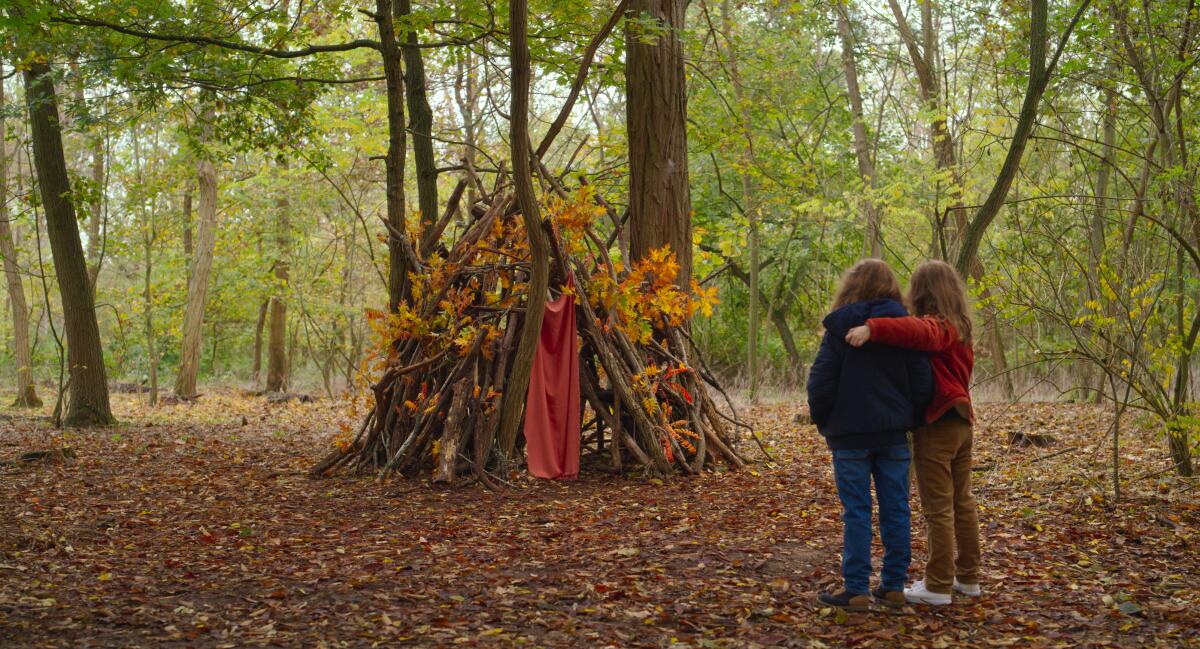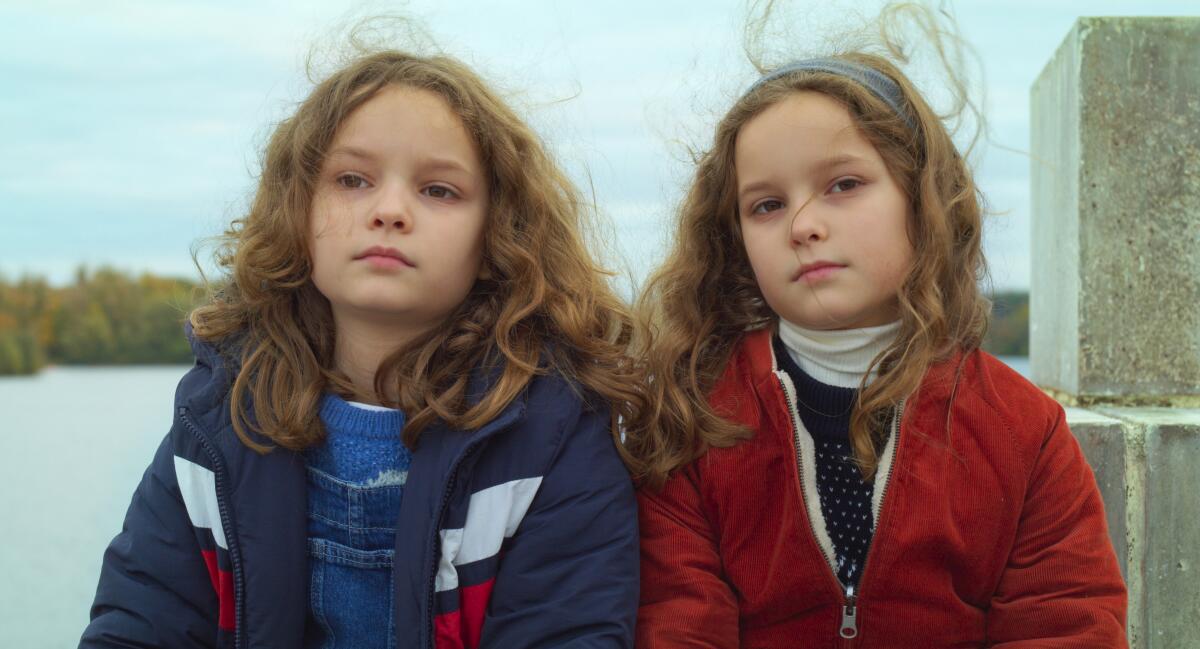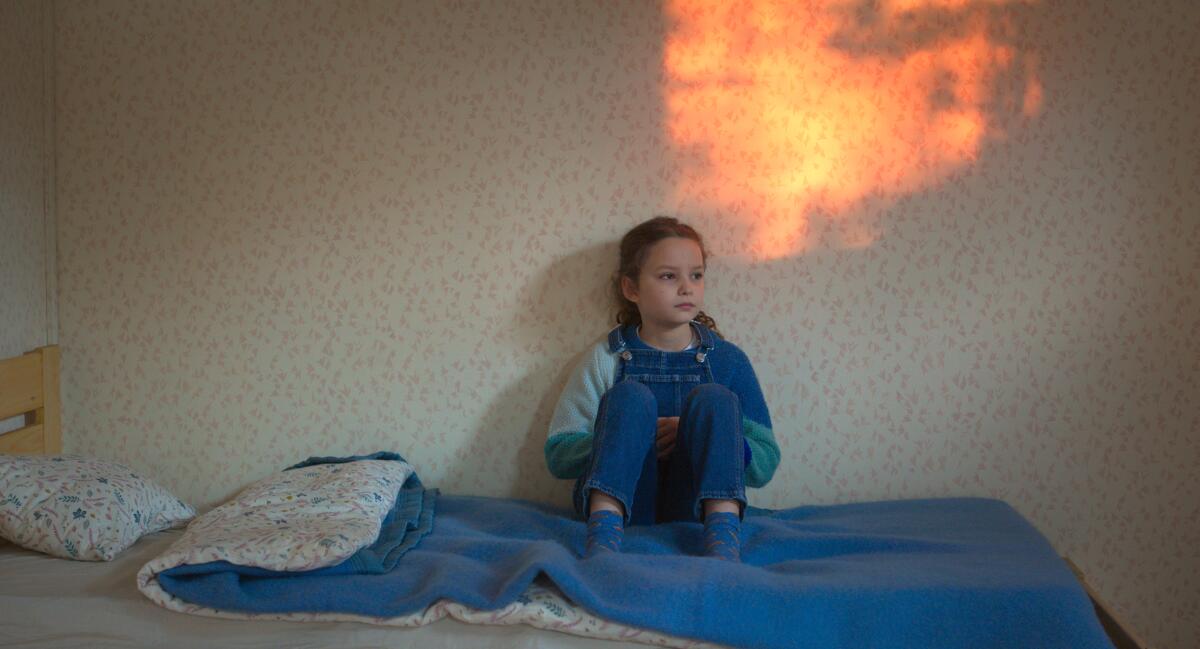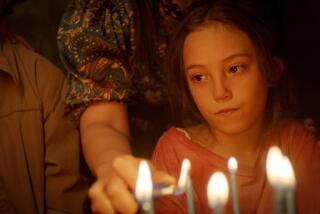Review: The sublime French drama ‘Petite Maman’ needs only 72 minutes to crush your heart

To be a mother or a daughter (or both) in the movies these days is to find oneself locked in a bitter cycle of generational angst, one so laced with resentment and adversarial feeling that only a supernatural crisis, apparently, can bring forth the possibility of reconciliation. What does it take for the two of them to see eye-to-eye — to regard each other not as clueless authoritarians or ungrateful dependents but as unique and vulnerable individuals, deserving of sympathy rather than scorn? In the recent animated comedy “Turning Red,” it requires some ancient shape-shifting sorcery. In the live-action multiverse fantasia “Everything Everywhere All at Once,” it’s an apocalyptic attack on human life, a threat that can only be neutralized through a bold declaration of mother-daughter love.
“Petite Maman,” the quietly spellbinding new film from French writer-director Céline Sciamma, proposes a gentler but no less radical alternative. The encounter at the heart of this movie, which runs just 72 minutes and will haunt you for long afterward, is magical precisely because of how seemingly unmagical it is. Notably, it arrives as a bittersweet balm for a relationship that, far from being combative, is suffused with warmth and tenderness. A heart-crushing early scene of 31-year-old Marion (Nina Meurisse), driving home while her 8-year-old, Nelly (Joséphine Sanz), passes her munchies from the backseat, tells you everything you need to know about their mutual adoration.
For your safety
The Times is committed to reviewing theatrical film releases during the COVID-19 pandemic. Because moviegoing carries risks during this time, we remind readers to follow health and safety guidelines as outlined by the CDC and local health officials.
Which is not to say that there’s nothing left for Marion and Nelly to discover about themselves or each other — quite the contrary. Marion has just lost her own mother after a long illness, and in the days that follow, she and her husband (Stéphane Varupenne) go about the solemn task of cleaning out the house in which she grew up. Nelly, who was close to her grandmother but frets about not having wished her a proper goodbye, distracts herself by poring over her mom’s old homework assignments and playing in the surrounding woods. That’s where she meets another 8-year-old who looks just like her, with the same long brown hair and sharp, far-reaching gaze. She’s played by Gabrielle Sanz (Joséphine’s identical twin sister), and her name is Marion.
From this simple, suggestive conceit — and also from the warm, autumnal hues of Claire Mathon’s exquisite images — Sciamma weaves an enchanted reverie, a mystery in miniature that hums with resonance and implication. “Petite Maman,” recently named the best non-English-language film of 2021 by the Los Angeles Film Critics Assn., surveys the landscape of childhood with a clear-eyed wonderment worthy of Victor Erice and Hayao Miyazaki. Is the younger Marion an imaginary friend, an invention of Nelly’s active mind? Or is she truly the child version of Nelly’s mother, which might account for the adult Marion’s sudden disappearance from the premises? Has the weight of this family’s grief temporarily ruptured the fabric of time and space, allowing past and present members to walk side by side?
Sciamma has little interest in explanations, and she slyly passes along that disinterest to her characters. Nelly, though as naturally inquisitive as any child, doesn’t bother questioning the strangeness of her circumstances, possibly because they don’t feel particularly strange. Neither does young Marion, who soon leads Nelly back through the woods to her house, which is, of course, an earlier version of the house Nelly herself is visiting. We spend a lot of time in both homes, following the girls back and forth between near-identical planes of reality. A world of unadorned walls and sparse furnishings, of giggly pancake breakfasts and hushed nighttime whispers, drifts in and out of focus.

The girls are not entirely alone during these visits. Nelly meets a younger version of her grandmother (Margot Abascal), also named Nelly, whose stern but kindly presence heightens the intimacy and gravity of the situation. (It also gives her younger namesake the chance to say goodbye as she intended.) Young Marion in turn meets young Nelly’s friendly, easily distracted dad, a.k.a. her own future husband — a potentially mind-bending twist that barely pierces the gossamer membrane of Sciamma’s conceit. “Petite Maman” generates continual surprise and delight, paradoxically, by treating even the strangest circumstances with a wry matter-of-factness.
It also instinctively grasps — and draws inspiration from — the creative logic of children at play. Nelly and Marion spend much of their time together devising games, whether they’re working on the large conical hut that Marion built in the woods or acting out a hilariously elaborate murder mystery. “Petite Maman” itself plays a kind of game with the viewer, and for all its aversion to exposition, it’s deft enough to lay down a few ground rules. We learn to tell the girls apart through sartorial cues — Nelly favors ponytails and blue tones, while Marion wears headbands and shades of red — but also, increasingly, through nuances of dialogue and mercurial flickers of facial expression. At times we stop trying to tell them apart at all, so serenely perfect is the sight of them simply inhabiting the same space and enjoying each other’s company.
The casting of the Sanz sisters is a bold formal coup that initiates a curious line of inquiry. Their characters are distinct people with distinct childhood experiences: The 8-year-old Marion, we learn, is about to undergo a medical procedure, and her father, unlike Nelly’s, doesn’t appear to be in the picture. But what binds them seems no less significant: not just the same face, voice and gestures but a common curiosity about the world, a shared capacity for exuberance and melancholy. To be able to appreciate and understand a parent for the individual she once was — and to recognize a glimmer of yourself in that lost history — is a gift granted to few people, and it’s one that Sciamma manages to unlock here through her singular mix of discipline and imagination.

Her rigor is undeniable (as is the spareness and precision of Julien Lacheray’s editing), but her approach never feels deterministic. Apart from her knack for finding perfectly gorgeous images — the vibrancy of crisp autumn leaves in a forest clearing, the play of shadows at the edge of a child’s bed — Sciamma’s great hallmark as a filmmaker is that she gives her characters the space to figure out who they are and what they might become. This was true of the young protagonists of “Tomboy” and “Girlhood,” and also of the romantic leads of “Portrait of a Lady on Fire,” two women granted a passionate, life-changing respite from the prying eyes of the outside world.
While the central relationship here is a friendship — and a blood bond — rather than a romance, “Petite Maman” presents its characters with a similar kind of freedom. And that freedom is no less meaningful for being so fleeting. No less than the condition of childhood itself, the movie opens up a world of possibilities, all of them beautiful and beguiling — and over all too soon.
‘Petite Maman’
In French with English subtitles
Rating: PG, for some thematic elements and brief smoking
Running time: 1 hour, 12 minutes
Playing: Starts April 22 at AMC the Grove 14, Los Angeles, and the Landmark, West Los Angeles
More to Read
Only good movies
Get the Indie Focus newsletter, Mark Olsen's weekly guide to the world of cinema.
You may occasionally receive promotional content from the Los Angeles Times.







